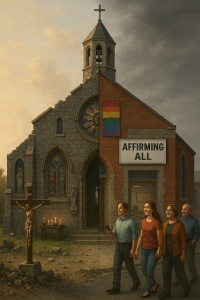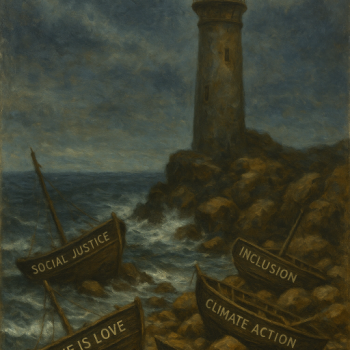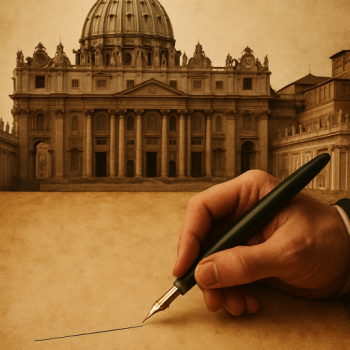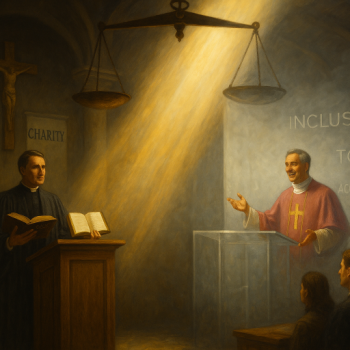
In my articles, I aim to articulate the Church’s magisterial teachings in relation to current and recent cultural movements. Given the recent attack on the Church’s moral teaching on the human person, many of my writings veer into topics of human sexuality and ethics. My critics (mainly from the progressive camp) lament this focus as “culture war” rhetoric and accuse me of using Church teaching to “bully” marginalized people.
Recently, Henry Karlson, a progressive Catholic, published an article titled Accepting Change: The Journey of a Faithful Christian. In it, he made the following claim:
It seems many follow the Christian faith, not out of love or devotion to God, but out of selfishness; it is a mercenary faith… This is why they have no problems promoting and engaging all kinds of evils, such as promoting and establishing laws which harm others – be it someone who is poor, or someone who is a different gender, different sexual orientation, a different nationality, or even, a different religion.
Karlson goes on to label “Christian Nationalism” (a clear swipe at conservative Christians) as a form of “pseudo-Christianity.” The types of “evils” this so-called pseudo-Christianity promotes (referenced in the linked article) include the Catholic dioceses of Bismarck and Fargo opposing North Dakota’s House Bill 1386, a pro-LGBTQ bill.
In this and many of his writings, Karlson treats progressive Catholicism as the most authentic expression of the faith. While he doesn’t explicitly say this, anyone familiar with his work can see this is the underlying assumption. In this, he aligns himself with others at America Magazine and the National Catholic Reporter.
So, what would the Church look like if Karlson and other progressive Catholics got their way? Would it remain essentially the same, or would it be radically transformed? I contend that the changes would so disfigure the Church as to make her indistinguishable from other progressive Christian institutions.
Change 1: The Church of Sentiment Over Substance
In a Church remade by progressives, doctrine and dogma would lose their grounding in divine truth. Emotions and personal experience would replace the Church’s foundation in revelation and natural law.
Specifically:
- A focus on subjective “lived experience.
- Homilies void of sin, judgment, or sacrifice.
- Therapeutic spirituality centered on comfort, not conversion.
- “Pastoral sensitivity” redefined as the affirmation of sexual preferences and lifestyles.
Therefore, a progressive Catholic Church would rest on ever-shifting feelings. Jesus would call all to come—and stay—as they are. The only unacceptable “change” would be fidelity to Catholic moral tradition.
Change 2: Each Person Becomes Their Own Magisterium
In the progressive Catholic vision, conscience reigns over both Scripture and the Magisterium. A new kind of revelation (based on marginalized identities and lived experience) would reshape Church teaching and practice.
Traditional moral norms, especially on sexuality and marriage, would be redefined or discarded in favor of this new “revelation.” In effect, each person becomes their own magisterium—free to decide truth for themselves, unbound by the Church’s doctrinal heritage.
Change 3: The Human Person Reimagined
Progressive reformers would discard centuries of Catholic teaching on the human person. Instead of receiving identity as a gift rooted in God’s design (male and female, body and soul) they would redefine personhood based on internal feelings rather than external reality.
Specifically:
- Biological sex would give way to gender identity. “Man” and “woman” would become social labels, not embodied realities.
- Gender self-expression would be affirmed without regard for truth or objective human flourishing.
- Catholic schools and parishes would adopt gender ideology: using preferred pronouns, honoring transitioned names, and treating transition as morally good.
- Clergy, parents, and faithful Catholics who uphold Church teaching would be viewed as oppressors and silenced.
Rather than affirm God’s plan for the human person, this Church would amplify the confusion and damage caused by gender ideology.
In this Church, the body no longer reveals God’s plan—it becomes raw material to reshape in our own image.
Change 4: A Church That Confirms the World Instead of Converting It
If progressives had their way, confession, worship, mission, and ordained ministry would all be reoriented toward secular ideals of equity and justice. These sacred realities would no longer sanctify and transform souls, but instead validate identities and endorse ideologies.
Confession:
- Sins like fornication, contraception, cohabitation, and homosexual acts would no longer be acknowledged.
- Penance would focus on social and environmental offenses: voting habits, carbon use, or complicity in “systemic oppression.”
Worship:
- Gender-neutral prayers, activist homilies, and diverse performances would take precedence over reverence.
- The Eucharist would be offered to everyone, regardless of belief or state of grace, because “exclusion” would be deemed the gravest sin.
Mission:
- Evangelization would be replaced with dialogue and inclusion.
- Proclaiming Christ as Savior would be seen as triumphalism. Calling sinners to conversion would be considered judgmental.
Holy orders:
- Progressive leaders would ordain women, transgender individuals, and others claiming marginalized identities in the name of justice.
- The priesthood would be stripped of its nuptial symbolism—no longer imaging Christ the Bridegroom.
The result: a Church stripped of its spiritual authority and remade into a mirror of the modern world.
Change 5: A Church Indistinguishable from the Episcopal Church
Moreover, if all these changes sound familiar, that’s because they already exist—in the Episcopal Church. Like the hypothetical progressive Catholic Church, the Episcopal Church rejects moral absolutes, ordains women and LGBTQ clergy, has largely abandoned evangelization, and continues to shrink in numbers while doubling down on ideological purity.
In the Episcopal Church, conscience is king. And it offers no barrier to entry for progressive Catholics. If Karlson and his allies seek a Church that affirms their beliefs, one already exists (and it would gladly welcome them).
Final Thoughts: Progressive Catholics Must Not Get Their Way
To conclude, a Church remade in the image of progressive ideology is no longer the Catholic Church. It would be another Episcopal-style institution: sacramental in form, secular in spirit, and spiritually powerless. Progressive reformers would soften doctrines, repurpose the sacraments, dismantle moral teaching, and erase the Church’s mission.
This vision isn’t renewal; it’s a foundational redefinition. It replaces the Gospel of Jesus Christ with the gospel of self-affirmation. It exchanges truth for tolerance, repentance for relativism, and transformation for therapeutic comfort. In such a Church, Christ is no longer the way, the truth, and the life—He becomes a flexible metaphor to bless whatever modern culture demands.
This battle confronts us, not over tone or pastoral strategy, but over the very identity and mission of the Church. The stakes could not be higher, they are eternal.
The choice is ours.
Do not be conformed to this world, but be transformed by the renewal of your mind, that by testing you may discern what is the will of God, what is good and acceptable and perfect.” (Romans 12:2).
Thank you!
If you liked this article, please leave your comments below. I am very interested in your opinion on this topic.
Read The Latin Right’s other writing here.
Please visit my Facebook page and IM your questions (and follow my page) or topics for articles you would like covered.













